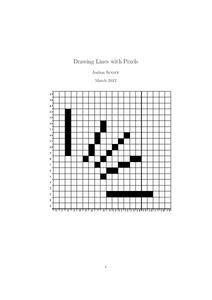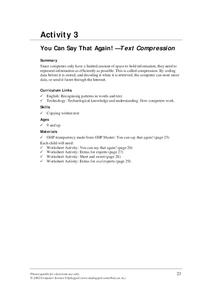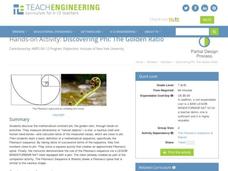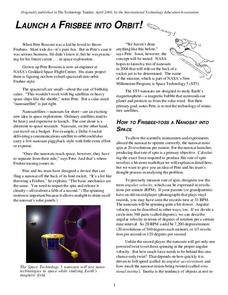Teach Engineering
Rube Goldberg and the Meaning of Machines
A Rube Goldberg machine does not really look like it would make work easier. Introduce your class to Rube Goldberg with a resource that shows how his inventions make simple tasks harder to complete.
Teach Engineering
Not So Simple
Compound machines, nothing more than a combination of simple machines working together, are the focus of an activity that asks class members to use the provided information to take a look at the way innovators combine simple machines to...
Teach Engineering
Levers that Lift
Introduce your class to to the remaining three simple machines-- the lever, pulley, and the wheel-and-axle with a plan that includes the three different types of levers in the discussion of levers. The lesson continues with the...
Teach Engineering
Get Me Off This Planet
What do Newton's Laws have to do with getting from Earth to Mars?The activities in this resource show how Newton's Laws work with rockets to get them into space. Background information includes facts about orbits and how orbits are used...
Teach Engineering
The Advantage of Machines
Show your students how to make their work easier. The first lesson in a series of 10 introduces the class to work and the way simple machines can be make work easier. The simple machines scholars can find in everyday items are inclined...
Teach Engineering
Weather Basics
Weather — there's more to it than meets the eye of the storm. With this resource young meteorologists learn about the basics of weather, including information about the factors that influence the weather, common weather vocabulary, and...
Computer Science Unplugged
Harold the Robot — Thinking About Programming Languages
Get young programmers thinking about programming languages with an activity that asks class members to craft directions for one person (teacher, another adult, or a class mate) acting as a robot. Participants direct the robot to...
Computer Science Unplugged
Drawing Lines with Pixels
How do the computers keep it straight? Using the provided algorithms, class members draw a line and a circle using pixels. They then check the drawings using a straight edge and compass to determine the accuracy of their drawings.
Computer Science Unplugged
Sharing Secrets—Information Hiding Protocols
Did you know that you can find the average age of a group of people without anyone having to real their age? This resource provides directions for way to do just that. After the activity, class members read a short passage that provides...
Kenan Fellows
Designing a Water Treatment Plant
How does dirty water get clean enough to drink? After viewing a PowerPoint that outlines the process water goes through at a water treatment plant, groups work together to design a chlorination chamber for a treatment plant.
Kenan Fellows
Determining Stream Health by the Diversity and Types of Benthic Organisms
How diverse are the benthic organisms found in local streams? Using the information learned in previous lessons on identification of macroinvertebrates and on calculating stream index values, groups determine the health of local streams....
Intel
Prototyping
I need something to test. The three sessions in this instructional activity have individuals build and test a prototype of their design. The first two sessions are devoted to prepping for the prototype by drawing up specifications and...
Wind Wise Education
Can Wind Power Your Classroom?
Can you power this? Individuals do an energy audit for the classroom to determine the amount of electricity needed to power it. Using either live data or sample data from wind turbines they decide whether it would power the classroom....
International Technology Education Association
Make a Pinhole Camera
With a little light and a lot of time, you can create some amazing images. This NASA-related task instructs pupils to build a pinhole camera. The lesson provides suggestions for different pictures to try with the pinhole camera and...
Teach Engineering
Lighting in My Classroom Survey
How much energy does it take to light a room? Class members calculate the total wattage it takes to light the classroom. Through calculations, responsible scientists determine the cost of energy for the year, then figure out how much...
Teach Engineering
Breathing Cells
Pairs work together to determine whether unknown solutions are either acids or bases by using a red cabbage indicator solution. After determining the general pH of the unknown solution, classmates blow into the same indicator after...
WindWise Education
What Factors Influence Offshore Wind?
What is that out in the water on the horizon? Teams work together to study the coastline using maps to determine the best and worst locations to place an offshore wind farm. The teams then build a scale model wind farm to see what it...
WindWise Education
Are Birds Impacted by Small Wind Turbines?
How do we know if the wind turbine at our school is impacting birds? Here, small groups work together and conduct field work in order to determine the impact of a human-made structure on birds. The groups also determine their searcher...
Wind Wise Education
Understanding Electric Power Generation
You mean the electricity does not come from the switch? As a class and in small groups, learners explore the sources of energy used to generate electric power. Worksheets guide groups into choosing a future electricity generating...
Computer Science Unplugged
You Can Say That Again! – Text Compression
Compression, the process computers use to store information, is the focus of a resource that presents two different stories that describe the concept of compression by eliminating repeated letters and replacing them with a pointer. The...
National Renewable Energy Laboratory
Biomass: Biogas Generator
It's a gas. Middle schoolers build a biogas generator following the directions in this resource. After a few days of observation, they demonstrate that the gas given off by the decomposing manure is flammable. The activity concludes as...
Computer Science Unplugged
Phylogenetics
Introduce your class to the concept of creating phylogenetic trees by playing a game of Telephone. Participants create a mixed-up message and through the use of distance matrices, the evolution of the message is recreated.
Teach Engineering
Discovering Phi: The Golden Ratio
Fe, phi, fo, fum. This activity leads pairs to find the ratio of consecutive terms of the Fibonacci sequence. The pairs find that the Fibonacci sequence can be found in many places. A discussion with the class shows that the ratios found...
International Technology Education Association
Launch a Frisbee into Orbit!
How fun it must be to play Frisbee in space! That is just what a NASA engineer gets to do, and you can learn how, too. Follow the instructions provided in this informational article to create your own satellite launcher. Afterward,...

























